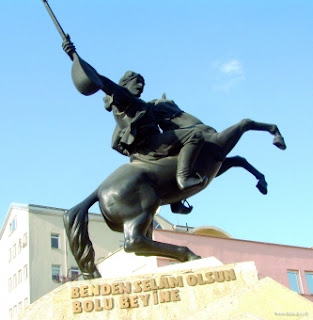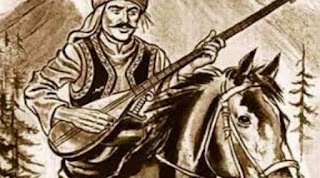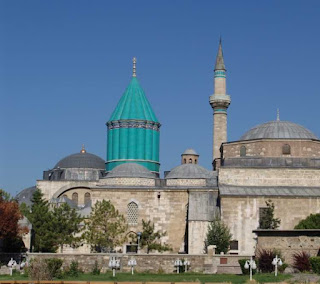A LEGENDARY FIGURE,KOROGLU
A LEGENDARY FIGURE of BOLU, KOROGLU
The Epic
of Koroghlu is a heroic legend prominent in the oral traditions of the Turkish peoples, mainly the Oghuz Turks.The legend typically describes a
hero who seeks to avenge a wrong. It was often put to music and played at
sporting events as an inspiration to the competing athletes. Koroghlu is the
main hero of epic with the same name in Azerbaijani, Turkmen and Turkish as well as some other Turkish languages. The epic tells about the
life and heroic deeds of Koroghlu as a hero of the people who struggled against
unjust rulers. The epic combines the occasional romance with Robin Hood-like chivalry.
Due to the
migration in the Middle Ages of large
groups of Oghuz Turks within Central Asia, South Caucasus and Asia Minor,
and their subsequent assimilation with other ethnic groups, Epic of Koroghlu
spread widely in these geographical regions leading to emergence of its Turkmen, Kazakh, Uzbek, Tajik, Azerbaijani, Turkish, Crimean Tatar, Georgian.
The story has been told for many generations by the "bagshy" narrators of Turkmenistan, fighter Ashik bards
of Azerbaijan and Turkey, and has been written down mostly in the 18th century
Life Story Of Koroglu
Köroğlu lived in Bolu during the reign of Murat III and became legendary with the struggle against Bolu Bey. The real name of this Anatolian poet, named after Köroğlu, whose name is mentioned in a Turkish epic dating back hundreds of years, is Ruşen Ali, and the poet has become freedom with the person. The poet who is identified with the protagonist of the Köroğlu Epic, which is described in many Turkish societies from Anatolian geography to Altay Turks, from Caucasian Turks to Azerbaijanis, was named "Köroğlu" and has been referred to by this name until today. Köroğlu, who was known to serve in the Ottoman Empire's 16th century wars against Iran, was known for his bravery as well as his poetry. Köroğlu went to the mountain to avenge his father and gained the sympathy of the people with his benevolent personality. The poet who struggled against Bolu Bey was identified with Köroğlu, who is the epic identity in the eyes of the public. The poet's life, which mentions many issues from bravery to love, from friendship to brotherhood, from love of nature to right and freedom in his poems, has also inspired many poets who lived after him. Speaking in a 1968 film directed by Atıf Yılmaz, one of the most important names in Turkish cinema and whose name was written in gold letters about his films, Köroğlu was played by Cüneyt Arkın, another legend of Turkish cinema. In addition, folk songs such as Kiziroğlu Mustafa Bey have been expressed for centuries and continue to be sung today. In legends, Köroğlu is mentioned as "Ruşen Ali" and it is said that his father's name is Yusuf. Köroğlu's father, Yusuf, is a well-known breeder. One day, Bolu Bey asks Köroğlu's child to bring a colt worthy of Yusuf, but he dislikes the horse Yusuf brought in his bag and draws miles in his eyes. Learning that his father's eyes were blinded by the Bolu Bey, Ruşen Ali, namely Köroğlu, took his father and foal to the Bolu mountains.In Dörtdivan,Bolu,people still tell that the horse of Koroglu,Kirat,still lives on the Koroglu Mountains.Because the legend tells that this horse drank immortality of water.
The Epic of Koroghlu is a heroic legend prominent in the oral traditions of the Turkish peoples, mainly the Oghuz Turks.The legend typically describes a hero who seeks to avenge a wrong. It was often put to music and played at sporting events as an inspiration to the competing athletes. Koroghlu is the main hero of epic with the same name in Azerbaijani, Turkmen and Turkish as well as some other Turkish languages. The epic tells about the life and heroic deeds of Koroghlu as a hero of the people who struggled against unjust rulers. The epic combines the occasional romance with Robin Hood-like chivalry.
Due to the migration in the Middle Ages of large groups of Oghuz Turks within Central Asia, South Caucasus and Asia Minor, and their subsequent assimilation with other ethnic groups, Epic of Koroghlu spread widely in these geographical regions leading to emergence of its Turkmen, Kazakh, Uzbek, Tajik, Azerbaijani, Turkish, Crimean Tatar, Georgian. The story has been told for many generations by the "bagshy" narrators of Turkmenistan, fighter Ashik bards of Azerbaijan and Turkey, and has been written down mostly in the 18th century
Life Story Of Koroglu





Comments
Post a Comment